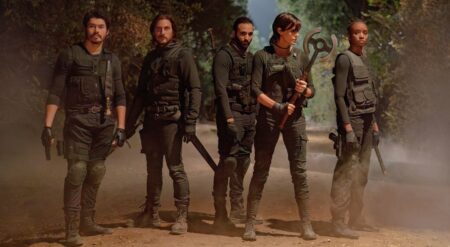
Love is powerful. It’s blinding, it’s all-encompassing, it’s stupefying, and it’s so beautiful. Otto Anderson (Tom Hanks) is a really hard man to love when A Man Called Otto begins. He’s grumpy, rude, and downright unpleasant, despite how truly kind everyone else is to him. When the day of his retirement comes around, Otto is prepared to make it his last. But fate has other ideas for him and his neighbors in this dark comedy directed by Marc Forster, written by David Magee, and based on the book and movie A Man Called Otto by Fredrik Backman and Hannes Holm, respectively.
A Man Called Otto is built on the premise that I don’t usually jive with: that all of our woes as a society would just be resolved if we would only talk to our neighbors again. It’s a narrative usually employed conservatively, implying that either people these days are selfish and their refusal to be a part of something bigger than themselves is degrading our social order, or, that supposedly our politics are really not so different after all and a good relationship with our neighbors would surely bridge those divides. Fortunately, A Man Called Otto doesn’t especially play into either trap, simply making the former deeply convincing and largely ignoring the latter—or at least taking the most conservative approach to it as possible.
Loving your neighbors is easy when they’re all as nice and warm as Otto’s. Just as Otto is working on his suicide, he has a new family move in across the street, Marisol (Mariana Treviño), Tommy (Manuel Garcia-Rulfo), and their two daughters. At first, like everyone in the world to him, he thinks they’re idiots. With Tommy, okay, maybe he has a bit of a point, in an endearing way, but as he and Marisol come into constant contact over her consistent pestering of him, Otto’s recent and distant past is slowly revealed. We learn about his recently departed wife Sonya (Rachel Keller ), his relationship with the only two remaining former friends on the street Anita (Juanita Jennings) and Reuben (Peter Lawson Jones), as well as two younger neighbors Jimmy (Cameron Britton) and Malcom (Mack Bayda).
Again, everyone in Otto’s closed-off neighborhood is quite lovely, where he obsessively makes sure every last rule he’s set over the years as the former Home Owners’ Association president over is followed. Where the first 20 minutes or so of A Man Called Otto turned me off because of just how downright grumpy Otto is—and because the first time the movie implements a flashback, it was a bit jarring until I got used to them happening and being presented the way they were—as soon as you start getting to know the others, especially Marisol, there’s no going back; you’re falling in love with the whole of them. Treviño in particular, is just so convincing in her role as a take-no-crap mother with a third on the way who will neither let her aloof husband get left behind nor abide by Otto’s shenanigans.
She’s the glue in the whole film, not just because she narratively has to be, but because she acts her butt off for it. She’s honestly more convincing than Hanks sometimes, who I feel like isn’t phoning it in necessarily, but in some of his grumpier moments, just isn’t acting very hard. It makes those moments schlocky at their best and a reminder that Hanks is, in fact, a grump in real life at their worst.
The movie only really works, ultimately, because Otto isn’t a bigot or a hateful man. It’s really easy to conflate grumpy old people who are sticklers for rules with conservative sticks in the mud who abhor difference and fear others. But from the setting in suburban Pittsburgh, the most middle-American place you can set a movie, to the fact that he tries to get his Spanish accent right when talking with the kids who’ve taken to calling him “abuelo Otto,” to the immediate jump to support and defend Malcom against his father when he’s kicked out of his house for being trans, and the un-subtle fact that the Andersons’ best friends since the 70s are a Black couple, A Man Called Otto aligns its social politics further to the left than its premise biases it towards.
It’s a bunch of scripted awe moments that are often on the nose, though occasionally more subtle. But they’re necessary to make Otto just liberal-seeming enough that any viewer of any kind who isn’t hateful themselves can fall in love with him. I wish it didn’t have to be done, but I’m glad that it was, because it allowed me to fall for every one of its emotional twists and turns. I cried for pretty much most of the movie for one reason or another; my lust for a love like Otto had, my sorrow for the circumstances of his and his neighbors’ lives, and the many upsetting moments the movie shows in rather graphic detail. I gasped quite loudly at one point choking back tears so as not to disrupt my fellow movie-goers too badly.
A Man Called Otto is a triumph of emotional manipulation in the kindest way I can mean it. It’s built on a fantasy that tends to disinterest me as a concept, yet, because of the downright loveliness of everyone involved and the relationships we see evolve over two hours, especially with Mariana Treviño, it worked on me like a charm. Certain depictions of Otto help make his character the more likable in sometimes crude but equally necessary ways, but A Man Called Otto is ultimately a beautiful fantasy about a world where people really do love their neighbors.
A Man Called Otto is playing now in theaters.
A Man Called Otto
-
Rating - 8.5/108.5/10
TL;DR
A Man Called Otto is a triumph of emotional manipulation in the kindest way I can mean it. It’s built on a fantasy that tends to disinterest me as a concept, yet, because of the downright loveliness of everyone involved and the relationships we see evolve over two hours, especially with Mariana Treviño, it worked on me like a charm.






